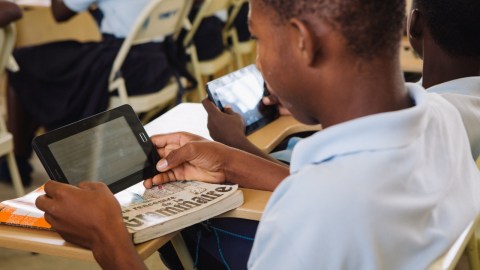Can Somebody Get This Kid An E-Reader?

The ideas that change the world are often those that, in retrospect, are the most obvious.
Upon understanding the central tenet of Darwin’s Theory of Natural Selection, Thomas Huxley famously responded, “How extremely stupid for me not to have thought of that!” International children’s education groups around the world, if they haven’t already, are likely to have a similar response when they hear about the new start-up charity Library for All.
THE BASIC PROBLEMS OF INTERNATIONAL BOOK DONATION
Library for All is doing some cool new things, but to fully appreciate how cool and new these things are, a cursory understanding of some lame old problems is required.
There are three fundamental issues that groups like Library for All are concerned with:
Books from the English-speaking world are, with astonishing frequency, written, published, and printed in English. Many of the countries with the most underfunded education systems, and thus the greatest need for donated books, are not English-speaking (much less English-reading) countries. For instance, Haiti.
And even if the books are in the right language, they often exhibit in a painfully clumsy manner the cultural disconnect between the donating countries and receiving countries. The power of literature often arises from the way it reflects our experience of reality, from a sensation of empathy for, or maybe even from, the characters on the page. How exactly do we expect an underprivileged child in an overflowing classroom in Port Au Prince to feel about Jack and Jill as they go up the hill?
There’s an implicit assumption, in donating a book, that the child receiving it will have the appropriate attention and guidance from a teacher to help them struggle through the learning curve and eventually fall in love with the words on the page, as so many of those donating recall doing during their own childhoods. But almost by necessity schools receiving donated books are underfunded in every respect, and are therefore also severely understaffed. Books aren’t the only input that goes into an education, just as students aren’t the only ones who benefit from their learning to read.
When donating, there is a direct trade-off between providing greater quantity of the same books or greater variation. If the books are to be used in a classroom, then many copies will be required for each child to follow along. But ideally, I would imagine that well-meaning supporters of charitable causes also want to encourage children to be able to explore literature on their own in libraries. With paper books, this is a zero-sum game.
LIBRARY FOR ALL’S BASIC SOLUTION
Library for All has solved all of these problems in a startlingly straightforward, holistic way.
First, they have developed, with the help and partnership of some very professional professionals at ThoughtWorks, the eponymous Library for All application. This application is “device agnostic,” which means that it is available for any device, from the Aakash tablet, a device that retails for only $40, to any upmarket mobile phone.
Now, this application is, in a word, awesome. Abovementioned overworked teachers will be trained in the technology and gain access to a massive database of educational materials and a platform for administering assignments to students, who receive their textbooks and readings immediately, at no cost, by direct download. Textbooks and readings that, it is worth mentioning, have been developed with the help of leading publishing companies to be linguistically and culturally appropriate for the children involved. Even ‘instructional videos’ are a part of the package. Check out this clip to see what I mean.
And because much of the developing world does not have the required infrastructure to take advantage of this kind of advanced networking technology, Library for All plans to establish a low-cost, low-bandwidth network in every community the organization is engaged with. Local communities will have the option of only allowing students access to these networks in order to preserve the bandwidth for exclusively educational purposes.
To bring these solutions to students across the world and reach its lofty goal of five million users in five years, Library for All has partnered with some of the bobbleheads at NYU’s Stern School to ensure that they have “the most effective strategy to scale across the developing world.” Together they plan to run a prototypical project in Gressier, Haiti, to analyze how to make improvements on their design and, eventually, scale up.
WHICH BASICALLY BOILS DOWN TO
Library for All belongs to that rare subset of abnormally effective agencies that answer complex problems with simple solutions: one tablet for each child, one small network for each classroom, one large low-cost wireless network for each community, and one protean application for the whole world.
But before they can get from 0 to 60 in 5 flat, first they’ve got to get the ball rolling. And like most common sense good ideas, getting going is both complicated and expensive. So, to fund their pilot project in Gressier, Library for All is hosting a Kickstarter campaign, I strongly encourage you to check it out. You can also help them build some buzz by telling your friends, following their Twitter and liking their Facebook page.
To find out more, check out the group’s website at www.libraryforall.org.




